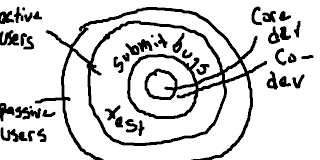live blogging the oekonox conference
social movements and the internet and how ngos use open source.
The internet is chaning political communication. There isa lot of research around these issues, for example: facebook and the obama campaugn. The impact includes previously excluded people. While the means have changed, goals have not.
Floss projects have tried to remain politically neutral. Even as social movemebts try to change the world. They represent a challenge to existing authority.
Social movement theory is explained very quickly by the speaker. One talks about social structures. Others talk about individuals. In the us, people talk about resources.
How new are new social movements? Where do they get their inspiration or resources? Are they product of post industrial economies? Are the participants all middle class? Are they intwrested in post material values? No, especially not in latin america where they engage things like access to clean water.
Resource mobilization theory
it’s good because you can talk about some other vocabulary words that are not meaningful to me.
There are different conflicts like ethnic or religious issues. But people work in more non-heirarchal structures. Maybe.
You’ve got you hacktivists. And then you’ve got your protest announcemebts or usibg email or whatever to progoate political messages.
What are the political unintended consequences of foss?
This theory does not talk of why, just how.
Mobilization structures include ideology. Activists may distrust foss organization may not have goals in common. There has only once been a foss physical protest. Tactics are more about production. Other movements are more about protest, generally.
Are all foss people white male and middle class? This has become more diverse recently. Private companies also participate in foss.
Recruitment is easier because onlibe causes don’t take much time, but the network is weaker.
Some argue that political ideology would reduce participation in open source. For example, the ron paul pitch on ardour certainly alientated me.
Who and how is the master frame defined. There are different ideologies arund the meaning of foss. In some culture, it’s about liberation. But in western europe, not as much.
Strategy and identity. This talk is over my head.
Greenpeace tried to migrate to foss, but had trouble. Indymedia has a principle of unity which includes dedication to foss. People new to technology may have problems with foss.
Dotcauses glue movements together. They are purely virtual. The symbols of actual protest are lost. But information can be widely distributed.
Are hack attacks ethical?
Why invest in social movements? Why do companies invest in foss? To look good! Why social movements use foss? Ngos generally only have one it person who may have a lot of trouble with foss. Do you give real support to your dotcauses? Which of your many ones do you help?
The world social forum will have a panel on foss, but foss may not want to be tied to the wsf. Some wsf folks want to use a foss organizational model.
Foss promotes liberation despite it’s apolitcal veneer.
Question: What about a conflict between openness in foss vs a need for privacy and protection in grups like indymedia? Their enemies will try to spy or disrupt.
Answer: Transparency is ideologically important to indymedia, so they compromise by using human moderation. You cannot impose ideology with technology.
Should they take money from the Ford Foundation?
Queston: If you subscribe to idelogy x, you must use foss. If you subscribe to ideology y, you must use foss. Does it apply to every ideology?
Answer: Human rights and social justice are not the goals of every ideology. If you don’t say what you stand for, somebody else will.
David Cameron says he likes open source. Does that mean it’s apolitical. Or is he a lying bastard who says he’s for lgbt rights but voted against lgbt rights legislation last week.
Question can old ideologies really apply to our shiny new product in which the rules of physics and banking no longer apply? Answer: if you don’t want to be labelled as a marxist, then name yourself as something.
Freedom can stand in conflict with the goals of equality. So how do we frame or name foss? This is still a contest. Is this actually a movement? All of this has happened before and will happen again.
Political agnosticism is dangerous. You must define yourself or else there will be a struggle to define you.
The word meritocracy is certainly a loaded term.
Incidentally, the presenter is using windows on her laptop.
Technlogy is changng our brains. Multitasking comes at the expense of memory.
The internet may be like the printing press. Ideolgies will expand rather than contract.

